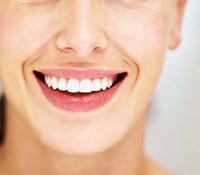
Eat for a Beautiful Smile- what you eat affects your teeth and gums too!
A few simple changes to your diet can help keep your teeth healthy for life.
You brush, you floss, you see your dentist, but do you eat with your oral health in mind? And it’s not just the usual suspects like sugar that may be harmful. Some surprising–even healthy–foods can cause cavities, while others can help protect you from decay, gum disease, and even bad breath. Here, how to tailor your diet for optimal dental health.
Eat carbs at mealtimes
A handful of potato chips or even a whole wheat roll can be just as damaging to your teeth and gums as a chocolate chip cookie. All carbohydrates break down into simple sugars, which are ultimately converted by bacteria in the mouth into plaque, a sticky residue that is the primary cause of gum disease and cavities. Carb-based foods such as breads and crackers tend to have “a chewy, adhesive texture,” making it easier for them to get caught between teeth or under the gum line, where bacteria can then accumulate, says Christine Gerbstadt, MD, RD, a spokesperson for the American Dietetic Association. Have carbs at mealtimes rather than as a snack: When you eat a larger amount of food, you produce more saliva, which helps wash food particles away.
Drink Tea
Black and green teas contain polyphenols, antioxidant plant compounds that prevent plaque from adhering to your teeth and help reduce your chances of developing cavities and gum disease. “Tea also has potential for reducing bad breath because it inhibits the growth of the bacteria that cause the odor,” explains Christine D. Wu, PhD, associate dean for research at the University of Illinois at Chicago College of Dentistry, who has conducted several studies on tea and oral health. Many teas also contain fluoride (from the leaves and the water it’s steeped in), which helps protect tooth enamel from decay.
Sip with a straw
Most sodas, sports drinks, and juices contain acids, such as citric and phosphoric, that can erode dental enamel–even if they’re diet or sugar-free versions. Sipping acidic drinks through a straw positioned toward the back of your mouth limits their contact with your teeth and helps preserve the enamel, says a study in the British Dental Journal.
Increase your C intake
“Vitamin C is the cement that holds all of your cells together, so just as it’s vital for your skin, it’s important for the health of your gum tissue,” says Jones. People who consumed less than 60 mg per day of C (8 ounces of orange juice or one orange contains more than 80 mg) were 25% more likely to have gum disease than people who took in 180 mg or more, according to a study of over 12,000 US adults conducted at the State University of New York University at Buffalo.
Eat 800 mg of calcium a day
People who do are less likely to develop severe gum disease, says a recent study by the Buffalo researchers. The reason: About 99% of the calcium in your body is in your bones and teeth. Dietary calcium–available in foods like cheese, milk, and yogurt–strengthens the alveolar bone in the jaw, which helps hold your teeth in place. The recommended amount is 1,000 mg per day for women younger than 50 and 1,200 mg for those older.
Dr. Daniell Mishaan, is a dentist in Midtown, New York City. For more information about what kind of preventive measures you can take to protect your teeth- please click here.
Learn more about the link between nutrition and dental health, here.

